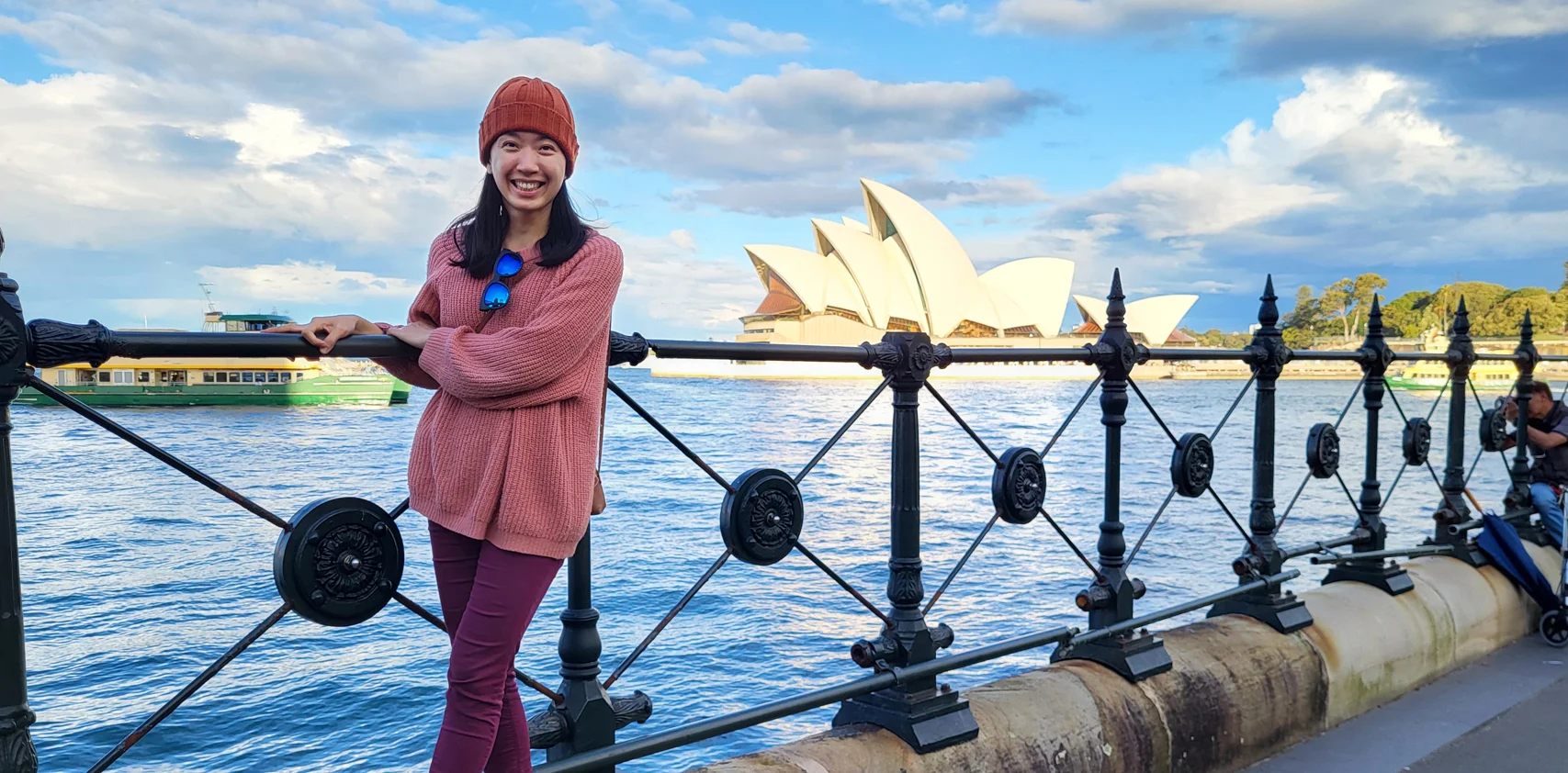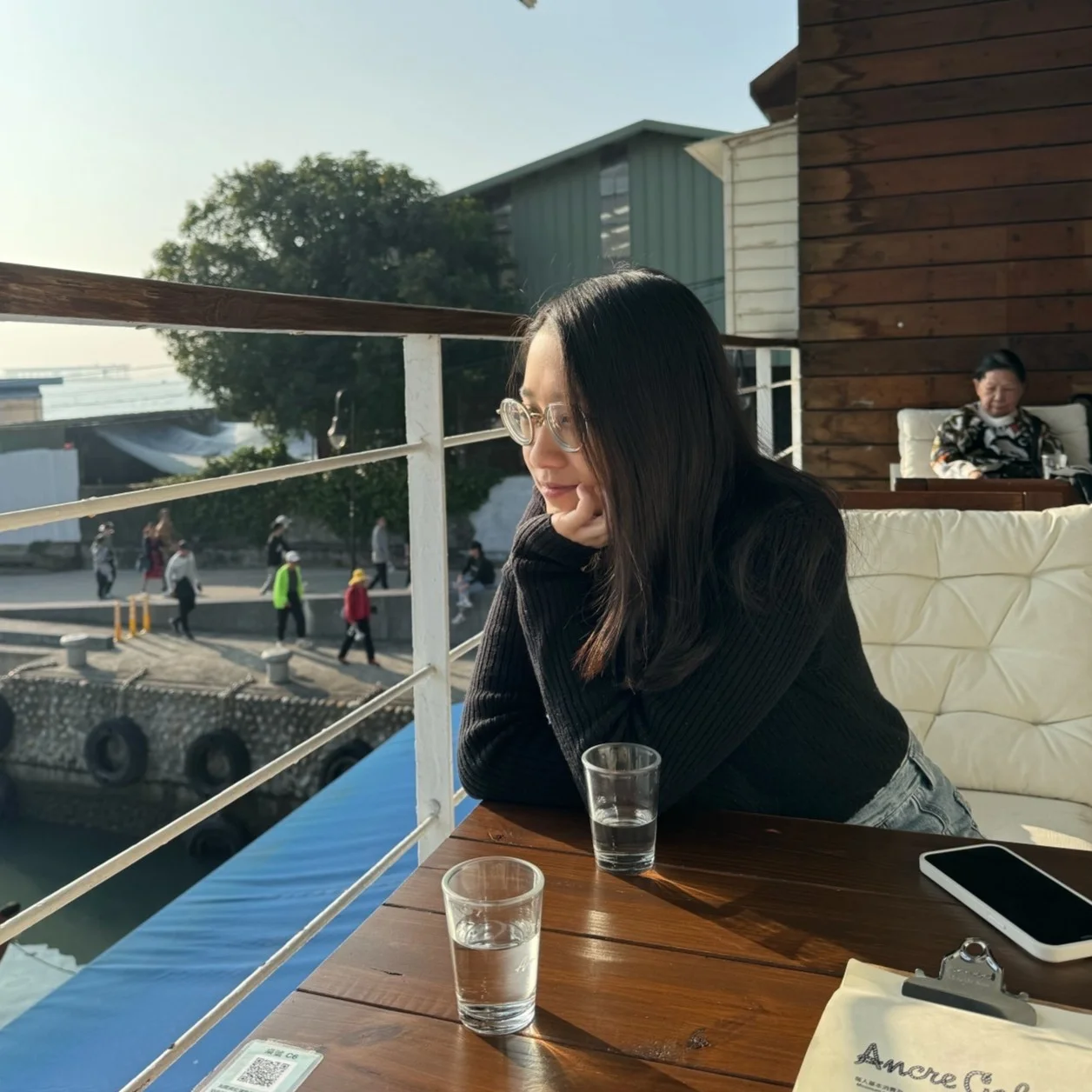English Speaking Coach Mei Exclusive Interview | How to Travel the World on a "Limited Budget" ?
December 5, 2023

Photo by Mei
【The article wants you to know】
1. Mei's sharing of "limited budget" digital nomad experience
2. Balancing work income and travel expenses: what to consider
3. Daily essentials – food, clothing, accommodation, transportation, and leisure: how to save on expenses
Many people aspire to be digital nomads, longing to work while exploring various places, but most hesitate to take the first step due to budget concerns. Mei, 37, manages to travel the world by being a digital nomad and practicing minimalist travel. Her experience might offer some reference for those with limited budgets who also wish to try digital nomadism and travel extensively!
Mei , who has traveled to 42 countries and countless cities, was an office worker five years ago, teaching English and handling digital marketing in an English school in the United States. With a passion for backpacking and a dream to travel the world, she persuaded her boss to allow her to work remotely, embarking on the journey of digital nomadism.
Initially, with a monthly salary of about NT$ 30,000 , Mei started her journey. She might work four to six hours a day and spend the rest slowly exploring a city. She might get to know local wildlife in Australia or attend a friend's wedding in India, spending a month deeply immersed in Indian life.
Since last year, Mei has visited places like Taiwan, Australia, New Zealand, India, Chiang Mai in Thailand, and Los Angeles in the United States.
More than two years ago, Mei even established her own English teaching brand, teaching English online. With a computer and internet connection, anywhere in the world could be her office.
Many people yearn to be digital nomads, like Mei, working and exploring the world simultaneously, but various worries hold them back. A common concern is, 'Without a substantial budget and a stable income, how can one afford to travel?'
However, Mei, an experienced traveler, said, 'People always talk about work and income, but few discuss the travel aspect. Actually, if you are already accustomed to traveling, the pressure regarding income is quite minimal.'
'Being good at traveling' doesn’t mean you have to be good at enjoying yourself, but under limited budget circumstances, it means knowing how to travel smartly and economically in terms of food, clothing, housing, transportation, entertainment, and so on.
Before Starting, Set Aside Time and Budget for Travel
Before embarking on digital nomadism and even discussing how to work to support one's living and travel expenses, Mei emphasized that one should clearly understand what they want to achieve by choosing digital nomadism.
Everyone has different objectives for choosing digital nomadism. Some choose it to have a steady income while sustaining long-term travel, while others might be pursuing their desired work style, among other reasons.
However, Mei mentioned that she met many people during her digital nomad journey. Some want to travel the world while also aiming to earn a lot of money or find it hard to let go of work, constantly postponing travel or sacrificing travel time. But when invested in work, they are always distracted, ending up with dissatisfaction in both, resulting in a not-so-good overall journey quality.
'If you want to travel the world, please be sure to allocate time for travel,' Mei emphasized. If travel is one of your goals in digital nomadism, manage it as an important aspect, incorporating it into your schedule. Regardless of how much time you give to travel, the most crucial part is to balance the weight of work and travel according to the purpose of your digital nomadism. By planning a certain proportion of time and budget for travel, you can enjoy the journey more comfortably.
Break Free from Monetary Limitations, and Travel Smartly on a Budget
Once you've clarified your initial intentions and budget for starting as a digital nomad, and if your purpose is to travel to various countries, you can start thinking about how to travel on a limited budget.
In the beginning, Mei relied on remote work, with a monthly income of about NT$ 30,000. Even when she later started taking projects or began entrepreneurship by establishing an online English teaching brand, and her income increased, she knew that if she wanted to travel for a longer time and visit more places, she must travel in a more smart way.
'Many people think that they have to be rich to travel, but I knew early on that this was wrong because many experiences don’t cost money,' Mei said. Despite a limited budget, Mei has many money-saving tips.
Typically, the most significant travel expenses might be on transportation and accommodation, but Mei has always kept these expenses to a minimum or even completely free of charge.
For accommodation, Mei chooses couch surfing, staying in cheap youth hostels, and even proactively proposes to hostels to work in exchange for accommodation or meals, saving on accommodation and meal expenses.
In terms of transportation, Mei also saves on fares by hitchhiking to various places. Since digital nomads are not restricted by time or work location, they can choose inexpensive long-distance buses or trains for commuting and work during the journey. When flying to different countries, she also compares flight prices on websites like Skyscanner or Google Flights, choosing to fly during off-peak times.
Even concerning food, Mei has participated in 'food sharing' movements, obtaining 'soon-to-expire' or 'expired' items that are still edible from many supermarkets and bakeries. Just search online for the city name along with the keyword 'food sharing,' and you can get information about 'food sharing' in that city.
Mei has many money-saving methods, and she said, 'If you dare to try new things, sometimes money really is not a problem!'
If you are just starting with a limited budget, you can begin from cheaper regions, such as cities in Southeast Asia. For instance, Chiang Mai in Thailand is a top choice for many.
Reducing Material Desires, Valuing Priceless Life Experiences
Mei sets out on each journey carrying only a backpack, keeping material desires to a minimum and not spending money on unnecessary souvenirs and the like. Instead, she chooses to be close to nature and values interactions with people, experiences that are free yet priceless.
Upon arriving in a new city, the first thing Mei does is search on Facebook for local communities involving hiking, writing, language exchange, etc., based on her interests. She meets locals or foreigners who have lived there for a long time, exploring the city’s people and things with them. Fortunately, she might also find like-minded friends in these people. Meanwhile, to break free from monetary constraints, Mei bravely tries hitchhiking and couch surfing, among others.
These experiences have given Mei precious life experiences that she cherishes deeply. She said, 'If you pay money to buy a travel itinerary, it seems to create a barrier between people.' Even when we go to foreign places, it’s still quite challenging to establish deeper connections with the locals.
For instance, in the United States, Mei and a traveling companion hitchhiked to their next destination, meeting a very friendly driver. Before Mei found a place to stay, the driver generously offered his camper van for Mei and her friend to stay temporarily. However, after getting to know him better, they discovered that he was a former drug addict who had become a debt collector after quitting drugs. Although it sounds a bit scary, for the driver, this wasn’t something he couldn’t share openly. His generosity and friendliness remain one of Mei’s most impressive memories from her travels.
Many people worry about the dangers of hitchhiking, staying in a stranger's house, or going out with strangers in foreign places.
Mei said that there are always risks in traveling, but the risks of hitchhiking, couch surfing, etc., are not as high as people imagine. 'After traveling for a long time, you actually become quite good at judging people,' Mei mentions. She would assess a person’s safety through their words and deeds, and she wouldn’t go to particularly dangerous places or do dangerous things. Often, she would also have companions with her. By staying alert and avoiding people or things that seem dangerous, the risks are actually quite low!
Excitedly, Mei listed places she still wants to visit in the future. Next year, she plans to explore Central and South America, and when summer comes, she wants to visit Scotland to learn about the whiskey culture that she has always admired. Having traveled to 42 out of nearly 190 countries worldwide, Mei continues to marvel at the vastness of the world. Free from material and monetary constraints, Mei’s digital nomadic journey around the world continues.
You can find more stories about Mei's digital nomad lifestyle on Super Mei Travel!
--
(This article is translated by the Digital Nomad editor group.)
This content is protected by copyright. Please respect the author's work and do not copy or distribute without permission.

Editor Group/邱于瑄
Yu-Syuan is the editor of "Digital Nomad" and "'Darencademy". She used to be a reporter for the magazine "Globel Views", traveled across Taiwan, able to write articles wherever there's internet and a laptop.

